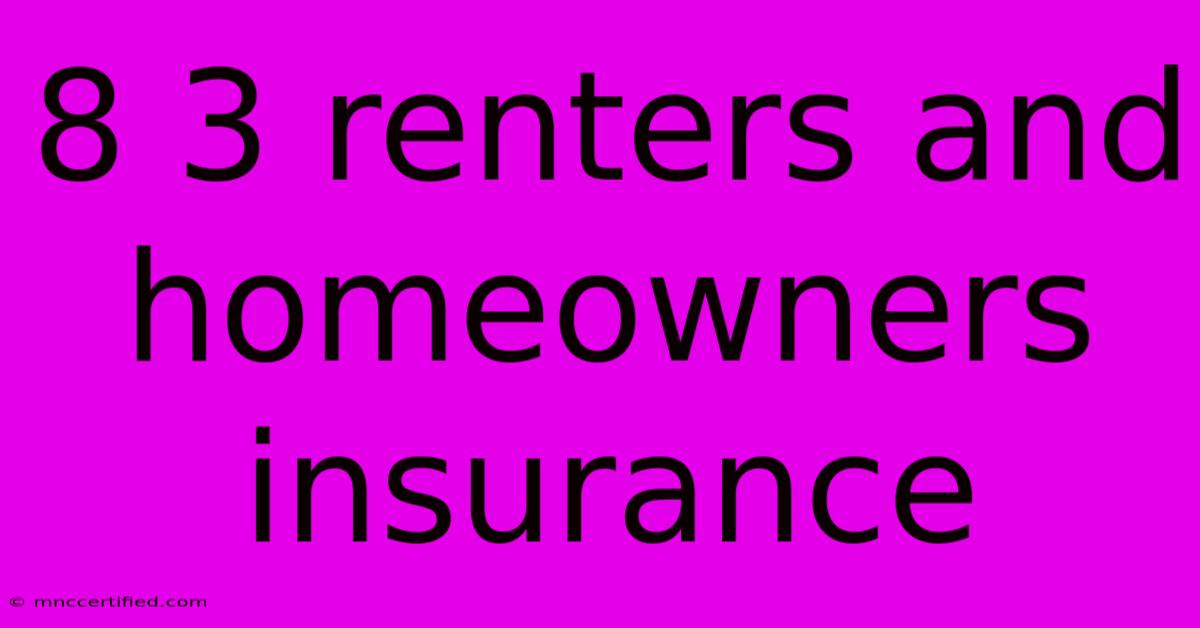8 3 Renters And Homeowners Insurance

Table of Contents
8 Tips for 3-Renters and Homeowners Insurance: Finding the Perfect Fit
Navigating the world of renters and homeowners insurance can be a daunting task, especially for young adults entering the 30s. With new responsibilities and valuable assets to protect, finding the right insurance policy is crucial. This guide provides 8 essential tips tailored specifically for those in their 30s, helping you make informed decisions and secure the best coverage for your needs.
1. Assess Your Unique Needs and Risks
Your 30s are often a time of significant life changes – marriage, starting a family, buying a home, or investing in valuable belongings. These changes influence your insurance needs. Consider:
- Lifestyle: Do you have expensive hobbies? Do you travel frequently?
- Assets: What are the most valuable items you own?
- Location: Are you in an area prone to natural disasters?
- Debt: Do you have substantial student loans or other debt?
Pro Tip: Talk to a qualified insurance agent to get a personalized assessment of your needs.
2. Understand the Difference Between Renters and Homeowners Insurance
Renters insurance protects your personal belongings and liability in case of theft, fire, or other covered events. Homeowners insurance covers the structure of your home, along with your personal property and liability.
Key Differences:
- Coverage: Renters insurance doesn't cover the building itself, while homeowners insurance does.
- Cost: Renters insurance is generally less expensive than homeowners insurance.
Pro Tip: If you're a renter, ensure your policy covers your belongings' actual cash value or replacement cost, providing adequate financial protection in case of loss.
3. Explore Coverage Options and Customize Your Policy
Don't settle for a generic insurance policy. Explore various coverage options to tailor your policy to your specific needs. Consider add-ons like:
- Flood insurance: Essential for those in flood-prone areas.
- Earthquake insurance: Necessary for areas susceptible to seismic activity.
- Personal liability coverage: Protects you against lawsuits arising from accidents on your property.
Pro Tip: Compare quotes from multiple insurance companies to find the best combination of coverage and price.
4. Don't Overlook Liability Coverage
Liability coverage protects you financially if someone gets injured on your property or due to your actions. This is especially important if you have a family or frequently host guests. Consider factors like:
- Number of people living in your home.
- Frequency of guests.
- Presence of pets.
Pro Tip: Ensure your liability coverage is sufficient to protect you from significant financial losses.
5. Consider the Impact of Your Credit Score
Your credit score can influence your insurance premiums. A good credit history can lead to lower rates. Tips to improve your credit score:
- Pay bills on time.
- Keep credit card balances low.
- Avoid applying for too much credit.
Pro Tip: Check your credit score regularly and take steps to improve it if needed.
6. Review Your Policy Annually for Changes
Life changes can impact your insurance needs. Review your policy annually to:
- Ensure adequate coverage for new assets.
- Adjust liability limits based on new family members or pets.
- Consider discounts for home security upgrades or safety features.
Pro Tip: Don't hesitate to ask your insurance agent for a policy review and adjust your coverage accordingly.
7. Take Advantage of Discounts
Many insurance companies offer discounts to policyholders. Consider:
- Bundle discounts: Combine renters or homeowners insurance with auto insurance.
- Safety discounts: Install smoke detectors, burglar alarms, or security systems.
- Loyalty discounts: Reward long-term customers.
Pro Tip: Inquire about available discounts to save money on your premiums.
8. Build a Strong Financial Safety Net
Insurance is a crucial part of financial planning, but it's not a replacement for a solid financial foundation. Consider:
- Emergency fund: Save 3-6 months of living expenses for unexpected events.
- Savings: Maintain a healthy savings account for future goals.
- Debt management: Prioritize paying off high-interest debt.
Pro Tip: By combining insurance with sound financial practices, you can build a robust safety net for your future.
Conclusion
Your 30s mark a crucial time in life, with significant changes impacting your financial needs. By following these 8 tips, you can secure the right renters or homeowners insurance policy to protect your assets and provide peace of mind. Remember to regularly review your policy, explore available discounts, and maintain a strong financial foundation for a secure future.

Thank you for visiting our website wich cover about 8 3 Renters And Homeowners Insurance. We hope the information provided has been useful to you. Feel free to contact us if you have any questions or need further assistance. See you next time and dont miss to bookmark.
Featured Posts
-
Cna Long Term Care Insurance Website
Nov 11, 2024
-
Knightbrook Insurance Payment Online
Nov 11, 2024
-
Premier League Live Man Utd Vs Leicester City
Nov 11, 2024
-
Where To Watch Forest Vs Newcastle Today
Nov 11, 2024
-
Eye Doctor Milwaukee State Insurance
Nov 11, 2024